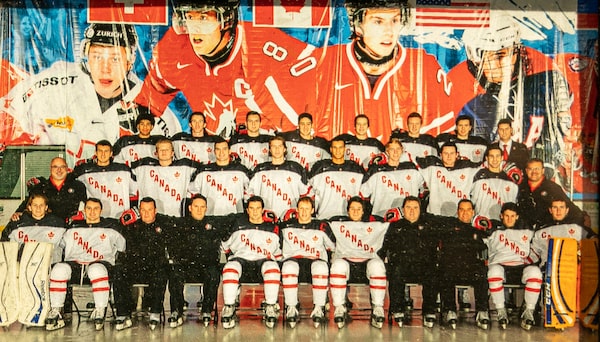Neil Doef with the stick he used during his last game with Team Canada East. Mr. Doef, a player from Smiths Falls, Ont., suffered a paralyzed left leg after colliding with the boards in 2014.John Kealey/The Globe and Mail
Hockey Canada has reached a settlement with a player who was paralyzed nearly a decade ago, after the organization acknowledged that it kept a special fund to help seriously injured players, which the family said they were never told about.
Neil Doef, a player from Smiths Falls, Ont., suffered a paralyzed left leg after colliding with the boards in 2014. However, Hockey Canada and its insurer refused to cover the full extent of his injuries.
Though the organization tells parents and players that it carries up to $1-million worth of coverage for paralysis, Mr. Doef – who now faces a lifetime of medical bills – was told he would only receive $30,000 because his injury didn’t fit the wording of the policy.
His lawyers were seeking enough funds to cover Mr. Doef’s future costs, saying Hockey Canada reneged on its duty to provide sufficient insurance. Terms of the settlement, which was reached days before a jury trial was to begin in Ottawa, were not disclosed.
Mr. Doef said he is relieved that the lengthy legal ordeal is finally over.
“I haven’t fully processed it yet, but I’m definitely happy it is over with,” he said. “If this could be the beginning of change for Hockey Canada as far as how they treat their players and how they deal with these situations moving forward, then that’s a good thing. I wouldn’t want anyone else to be in my situation.”
Mr. Doef lost a promising career from the injury, which occurred at the 2014 World Junior A Challenge, a top international tournament. After racing an opponent for a loose puck, he fell headlong into the boards, crushing part of his spine.
While he was in hospital, Mr. Doef’s parents say Hockey Canada told them he would be fully covered by the organization’s insurance, which is included in player registration fees. But Hockey Canada and its insurer, AIG, later moved to fight his claim, arguing that Mr. Doef, who regained some movement in his injured left leg through extensive physiotherapy, did not qualify – even though doctors diagnosed him as paralyzed.

Mr. Doef played for Team Canada East during the 2014 World Junior A Challenge, a top international tournament.John Kealey/The Globe and Mail
Mr. Doef’s case called into question how Hockey Canada used its controversial National Equity Fund, a multimillion-dollar financial stockpile built by registration fees from players across the country. The Globe and Mail revealed last summer the little-known fund was used to settle sexual-assault cases, without the public knowing.
Facing criticism from MPs in Ottawa over its undisclosed use of registration fees in such cases, Hockey Canada defended the National Equity Fund – saying it wasn’t only used to settle sexual-assault allegations; it was also in place to assist seriously injured players.
But lawyers representing Mr. Doef questioned such claims in court documents.
Meanwhile, the National Equity Fund contained upward of $15-million from registration fees stockpiled for uses in sexual-assault claims that parents and players weren’t told about.
After The Globe’s investigation last July revealed how the fund operated, Hockey Canada was forced to disclose to MPs in Ottawa that it quietly used the National Equity Fund to pay nine sexual-assault settlements since 1989, totalling $7.6-million.
Through years of rehabilitation, Mr. Doef has relearned to walk, but with limited mobility and a laboured gait. He has difficulty fully bending his left knee and ankle. The accident also left him with extensive nerve damage. He lacks fine motor skills in his fingers and feeling in his legs. His doctors say his condition will worsen over time.
His mom, Bobbi-Jean Doef, said she was upset to learn later on that the organization kept millions of dollars stockpiled in the National Equity Fund, supposedly for such a situation, but was claiming it couldn’t help with her son’s medical costs.
“I hope that nobody as a parent has to go through the same kind of battle we’ve had to go through,” she said. “It was definitely one of the toughest things in my life. So if we’ve made even just a little bit of change, that’s what we’re hoping for.”
Mr. Doef is hoping to turn his love of strategy, analyzing video footage and parsing advanced stats into a career in hockey.John Kealey/The Globe and Mail
Hockey Canada’s insurer, AIG, also reached a separate settlement for an undisclosed amount.
“It’s been a long haul,” his father, Bruce Doef, said, adding that he hopes the settlement signals the organization will assist other players in Mr. Doef’s position.
Mr. Doef, 26, said he is relieved he can now start focusing on the future.
A top student, he won a scholarship to play for Princeton University before the injury. Though he couldn’t play, Princeton honoured the scholarship and invited him to be around the team during his time there.
Mr. Doef graduated with a degree in economics in 2021 and said his dream is to pursue a career in hockey by using his math background. His love of strategy, analyzing video footage and parsing advanced stats are things he’s hoping to turn into a career in the sport.
“I’ve never lost my love for hockey. It’s still a passion that runs deep,” Mr. Doef said. “I’d love to see myself working in the game at some point in the near future, in whatever capacity that may be.”
Ending the lengthy legal battle, Hockey Canada commended Mr. Doef in a statement announcing the settlement agreement.
“Neil is a valued member of the hockey community, and we wish to recognize his courage,” the Hockey Canada statement said. “He played Canada’s national sport with talent and passion and has demonstrated tremendous resilience and determination during his rehabilitation, in no small part because of his strength of character.”